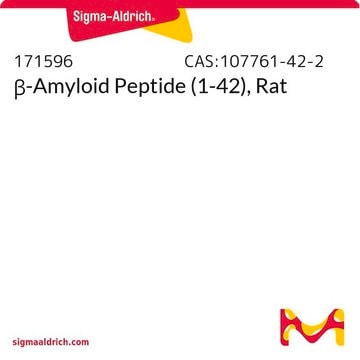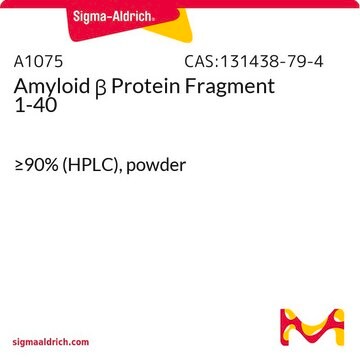SCP0040
Amyloid β 17-42 human
≥80% (HPLC)
Se connecterpour consulter vos tarifs contractuels et ceux de votre entreprise/organisme
About This Item
Formule empirique (notation de Hill):
C119H194N28O33S1
Poids moléculaire :
2577.05
Code UNSPSC :
12352200
Nomenclature NACRES :
NA.32
Produits recommandés
Essai
≥80% (HPLC)
Forme
lyophilized
Composition
Peptide Content, ≥80%
Conditions de stockage
protect from light
Température de stockage
−20°C
Amino Acid Sequence
Leu-Val-Phe-Phe-Ala-Glu-Asp-Val-Gly-Ser-Asn-Lys-Gly-Ala-Ile-Ile-Gly-Leu-Met-Val-Gly-Gly-Val-Val-Ile-Ala
Application
Amyloid β (Aβ) refers to peptides derived from Amyloid precursor protein that vary in length from 36-43 amino acids. Aβ(s) peptides, their peptide fragments and mutated fragments are used to study a wide range of metabolic and regulatory functions including activation of kinases, regulation of cholesterol transport, function as a transcription factor, and regulators of inflammation. Aβ(s) peptides and their peptide fragments are also used to study oxidative stress, metal binding and mechanisms of protein cross-linking in the context of diseases such as Alzheimer′s disease and neurodegeneration.
Code de la classe de stockage
11 - Combustible Solids
Classe de danger pour l'eau (WGK)
WGK 3
Point d'éclair (°F)
Not applicable
Point d'éclair (°C)
Not applicable
Faites votre choix parmi les versions les plus récentes :
Certificats d'analyse (COA)
Lot/Batch Number
Vous ne trouvez pas la bonne version ?
Si vous avez besoin d'une version particulière, vous pouvez rechercher un certificat spécifique par le numéro de lot.
Déjà en possession de ce produit ?
Retrouvez la documentation relative aux produits que vous avez récemment achetés dans la Bibliothèque de documents.
Wanli Wei et al.
Brain : a journal of neurology, 125(Pt 9), 2036-2043 (2002-08-17)
The p3 peptide [amyloid beta-peptide (Abeta) 17-40/42], derived by alpha- and gamma-secretase cleavage of the amyloid precursor protein (APP), is a major constituent of diffuse plaques in Alzheimer's disease and cerebellar pre-amyloid in Down's syndrome. However, the importance of p3
Yifat Miller et al.
Biophysical journal, 97(4), 1168-1177 (2009-08-19)
Abeta(17-42) (so-called p3) amyloid is detected in vivo in the brains of individuals with Alzheimer's disease or Down's syndrome. We investigated the polymorphism of Abeta(17-42) oligomers based on experimental data from steady-state NMR measurements, electron microscopy, two-dimensional hydrogen exchange, and
Jie Zheng et al.
The journal of physical chemistry. B, 112(22), 6856-6865 (2008-05-07)
We report all-atom molecular dynamics simulations of annular beta-amyloid (17-42) structures, single- and double-layered, in solution. We assess the structural stability and association force of Abeta annular oligomers associated through different interfaces, with a mutated sequence (M35A), and with the
Nikolay Blinov et al.
Biophysical journal, 98(2), 282-296 (2010-03-27)
Amyloid fibrils are associated with many neurodegenerative diseases. It was found that amyloidogenic oligomers, not mature fibrils, are neurotoxic agents related to these diseases. Molecular mechanisms of infectivity, pathways of aggregation, and molecular structure of these oligomers remain elusive. Here
Notre équipe de scientifiques dispose d'une expérience dans tous les secteurs de la recherche, notamment en sciences de la vie, science des matériaux, synthèse chimique, chromatographie, analyse et dans de nombreux autres domaines..
Contacter notre Service technique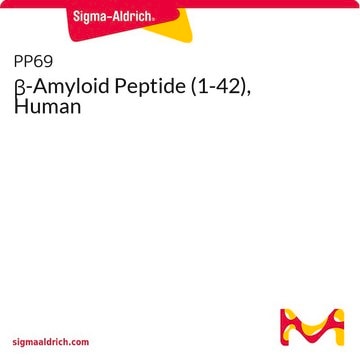

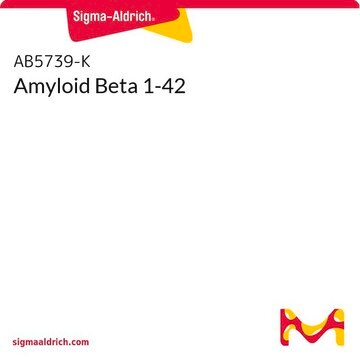
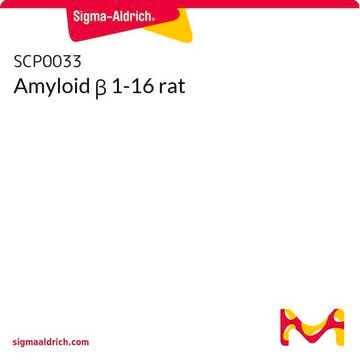

![[Ala28]-Amyloid β 25-35 ≥95% (HPLC)](/deepweb/assets/sigmaaldrich/product/images/306/938/dd9f7c72-cfca-4ea3-8e10-a7a2a7994639/640/dd9f7c72-cfca-4ea3-8e10-a7a2a7994639.jpg)
